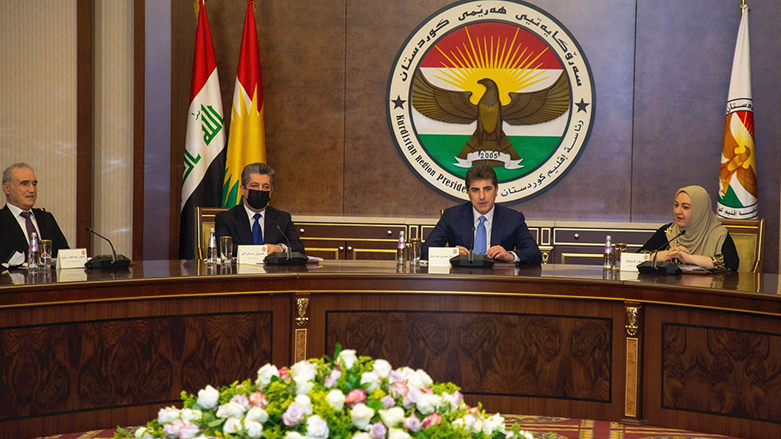Kurdistan Region issues six points on top Iraqi court ruling on oil and gas law

ERBIL (Kurdistan 24) – The Kurdistan Region's four presidents concluded their meeting on Monday by issuing six points in response to the recent Iraqi Federal Supreme Court's ruling on the autonomous region's oil and gas law.
"The joint meeting of the four presidents in the Kurdistan Region discussed the decision of the Iraqi Federal Supreme Court issued on February 15, 2022, regarding the oil and gas law in the Kurdistan Region," a joint statement from the four presidents read.
The four presidents are Kurdistan Region Prime Minister Masrour Barzani, President Nechirvan Barzani, Parliament Speaker Rewaz Faiq, and Head of the Cassation Court Abdul-Jabbar Aziz Hassan.
The meeting confirmed, according to the statement, that "the decision of the Federal Supreme Court is unacceptable, and that the Kurdistan Region will continue to exercise its constitutional rights and will not give up in any way its constitutional rights and entitlements, and will take all legal and constitutional measures in order to protect those rights."
The statement indicated that the first reason for their rejection of the decision was because it was "contrary to the text, spirit and principles of the true federal system, and a clear violation of the constitutional rights and entitlements of the Kurdistan Region."
The second reason was that it "is indirectly an unconstitutional amendment to the constitution, because it led to the stripping of constitutional authority from the regions and granting them to the federal authority, and this is inconsistent with the powers of the Federal Court and is a retreat from the federal system."
The third reason is "the court relied, in legislating its decision, on Iraqi laws issued in the years 1976 and 1985, which are central laws that are inconsistent with the principles of the new Iraqi constitution of 2005, which changed the system of government in Iraq from the central system to the federal system and clearly distributed powers between the regions and governorates, and federal authority."
Their fourth reason was that "this decision, in addition to undermining the constitution and the federal system, at the same time has hidden intents behind it and it is not a neutral decision, especially since Iraq is going through sensitive and complex political situations, and the political parties are engaged in dialogue to reach an understanding and finding a way out of the political stalemate, and this decision complicates the situation."
Their fifth reason was "the Kurdistan Region's oil contracts were concluded based on the oil and gas law of the Kurdistan Region and the text of Article (112) of the Iraqi constitution, while the federal authorities, after 17 years, have failed to perform their legal duty to formulate an oil and gas law in Iraq despite the initiatives of the Kurdistan Region in 2007, and the federal government then retracted the joint draft of the oil and gas law that had been approved."
In their sixth and final reason, they stressed that it is "crucial that the formation of the Federal Supreme Court be under a new law in accordance with the provisions of Article (92) of the Constitution and perform its functions in accordance with the Constitution."
They added that "all states' constitutional establishment to operate under a new law in a manner that ensures the embodiment of the federal system."
The Presidency of the Kurdistan Region will continue, according to the statement, "to work with the political parties in the Kurdistan Region and Iraq and with the international community, in order to take action that protects the constitutional rights of the Kurdistan Region."
The statement noted that "the Kurdistan Parliament will take the necessary legal and constitutional measures, and the Kurdistan Region Judicial Council will continue to work from its constitutional position with the Iraqi judicial centers to defend the constitutionality of the region's rights."
The statement concluded with the four officials "expressing readiness to solve problems on the basis of the constitution, and to continue constructive dialogue with the federal government" and stressing that "the friends of Iraq and the international community support solving problems on the basis of the constitution."